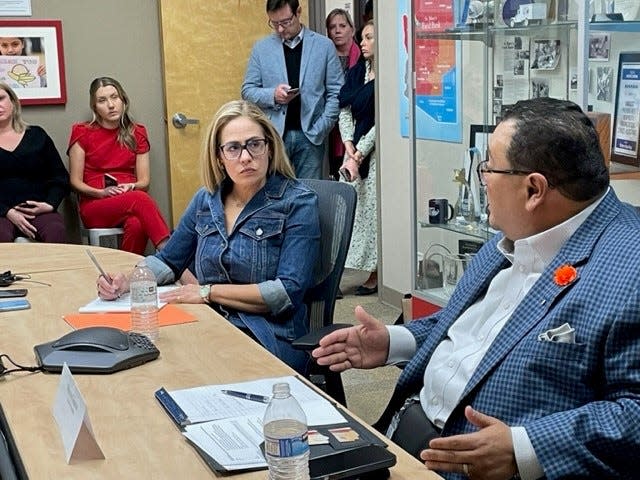Sen. Kyrsten Sinema discusses food insecurity in Arizona, seeks ideas for new farm bill

- Oops!Something went wrong.Please try again later.
U.S. Sen. Kyrsten Sinema met recently with Arizona stakeholders to talk about food insecurity and other aspects of the nutritional aspects of the new farm bill.
In Arizona, one in nine adults and one in six kids face food insecurity.
The 2018 farm legislation is set to expire Sept. 30. The law authorizes programs such as the Supplemental Nutrition Assistance Program, or SNAP, formerly known as food stamps; the food distribution program in Native American communities; and the Emergency Food Assistance Program, or TEFAP.
During a roundtable discussion Friday at St. Mary's Food Bank in Phoenix, Sinema, I-Ariz., asked representatives from various agencies to prioritize the flexibilities within the programs that they wanted to have included in the bill, which enjoys support from both sides of the aisle.
Ideas included the ability for kids to take meals home from programs that provide food after school and to take enough to last multiple days.
Other suggestions included easing the bureaucracy required to enroll in nutrition-related initiatives by having applications for various food assistance programs streamlined into one form, making it easier for people in need to access benefits.
More politics news:Kelly, Sinema near top of security expenses list in Congress
Others asked for a continued increase in programs at COVID-19-funding levels, which Sinema said would be difficult given the state of the economy. Participants also expressed concern over the supply chain, which Sinema said might be addressed in the Bipartisan Infrastructure Law she helped author.
"It's one of the most bipartisan bills Congress works on," Sinema said. "It represents important connections between agricultural priorities and the nutrition needs of some of the most vulnerable in our country."
TEFAP serves as a supplement to SNAP and serves people who are having difficulty affording food but make too much money to qualify for SNAP. The food is purchased by the U.S. Department of Agriculture and sent to the states, which then often have food banks give out the food to those in need. During the COVID-19 pandemic, TEFAP received an extra $850 million that will not be reauthorized.
During the pandemic, food assistance programs were given more accommodations to get people the food assistance they needed. Sinema asked which flexibilities were the most helpful to include in the new bill, which is set to be the most expensive farm bill in history.
The Arizona Republic asked Sinema if she was worried about the cost of the bill. "It is likely that the farm bill could be more expensive because the cost of food has gone up," she said. "And that's why I was so focused today in this meeting to figure out how to be creative and flexible with the dollars we do have, rather than thinking about how the dollars become more expensive or that there are more of those dollars."
People can submit proposals to the Senate's Agriculture Committee at www.agriculture.senate.gov/farm-bill. Alternatively, Arizonans can also send their suggestions to Sinema on her website at https:www.sinema.senate.gov or call her office at 202-224-4521 in Washington; at 602-598-7327 in Phoenix; or at 520-639-7080 in Tucson.
Tara Kavaler is a politics reporter at The Arizona Republic. She can be reached by email at tara.kavaler@arizonarepublic.com or on Twitter @kavalertara.
This article originally appeared on Arizona Republic: Sinema discusses food insecurity in Arizona, seeks ideas for farm bill

